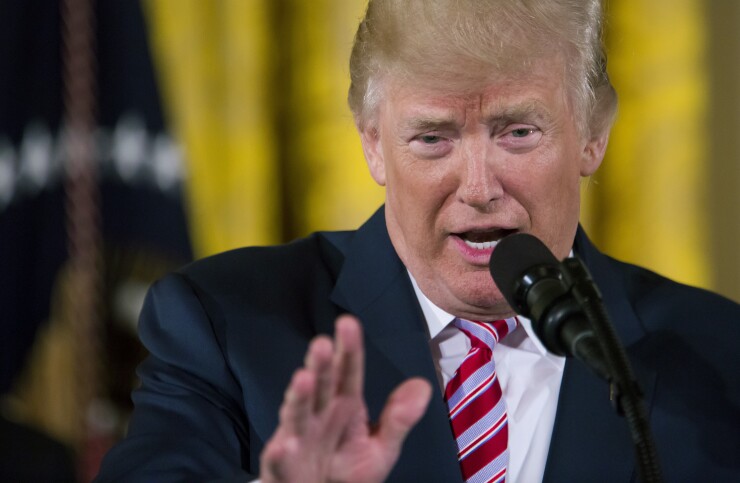DALLAS -- President Trump has created a 15-member Presidential Advisory Committee on Infrastructure to study the scope and effectiveness of federal infrastructure funding without naming anyone to the council or setting a date for its first meeting.

The executive order established the council within the Commerce Department and said the panel will also look into the support and delivery of transportation infrastructure projects as well as renewable energy, electricity transmission, broadband, and pipelines.
“It shall be the policy of the executive branch to advance infrastructure projects that create high-quality jobs for American workers, enhance productivity, improve quality of life, protect the environment, and strengthen economic growth,” according to the July 19 executive order.
The president’s new infrastructure panel will investigate the funding and financing options it sees as capable of generating new infrastructure investments over the next 10 years. It will also look at ways to increase public-private partnerships in infrastructure, according to the order, “including appropriate statutory or regulatory changes.”
Members will be appointed by the president to represent various sectors and interests, including finance, construction, labor, real estate, and economic development.
The move comes as Republican lawmakers express doubt that Congress can take up a large infrastructure package as well as health care and tax reform legislation in the 65 legislative days remaining on this year’s calendar following the planned month-long August recess.
Transportation Secretary Elaine Chao assured senators on the Appropriations Committee’s transportation panel earlier this month that the administration plans to unveil its long-promised $1 trillion, 10-year infrastructure program in September. The proposal will include at least $200 billion of new direct federal funding, she said.
“We hope to provide more details on the infrastructure program this fall,” Chao said at the July 14 hearing. “I am looking forward to discussing this with the Congress.”
A White House spokeswoman said infrastructure renewal is one of Trump’s top priorities. A task force led by the Transportation Department with representatives from more than a dozen federal agencies is developing the plan and how to pay for it, she said.
Sen. John Thune, R-S.D., chairman of the Senate Commerce, Science, and Transportation Committee, said last week that lawmakers are waiting on word from the White House on how to proceed.
“They’re supposedly going to submit some sort of plan in the fall, so we’ll see,” Thune said. “We’re sort of waiting on the administration to tell us what it is exactly they want to do.”
Thune said the Senate is ready to begin working on infrastructure but other issues must be handled first.
“I’d like to see infrastructure get done but I’ve always said, that in terms of how things are sequenced, it’s more likely that they would do tax reform first,” he told reporters at a news briefing. “That might push infrastructure into sometime next year.”
Rep. Sam Graves, chairman of the highways panel of the House Transportation and Infrastructure Committee, said tax reform is necessary to provide the revenue needed for the administration’s 10-year proposal.
Tax reform should include an increase in the federal gasoline tax or other road user fees to fund more infrastructure projects, the American Association of State Highway and Transportation Officials said in a letter last week to the Senate Finance and House Ways and Means committees.
Action now will prevent the depletion of the Highway Trust Fund at the end of fiscal 2020 when the five-year transportation funding law enacted in 2015 will expire, AASHTO said.
A long-term solution for the HTF would improve the odds of passing comprehensive tax reform this year, the American Road & Transportation Builders Association said in a letter last week to Sen. Orrin Hatch, R-Utah, chairman of the Senate Finance Committee.
“And by long-term solution, we do not mean a four- to six-year patch from repatriated overseas profits of a few large companies or some other one-off mechanism,” ARTBA said. “We need a sustainable funding solution to put this critical national program back on solid footing for the next decade.”





